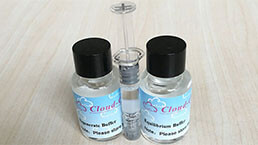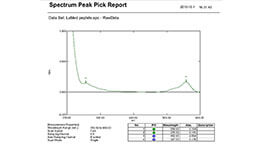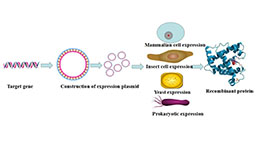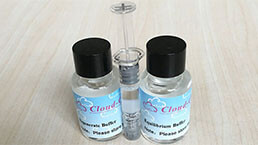Recombinant Tryptase (TPS) 

TPSAB1; Tryptase Alpha/Beta 1; Tryptase Alpha II; Tryptase Beta I; Tryptase-I; Tryptase-II; Tryptase-III
Overview
Properties
- Product No.RPB070Po01
- Organism SpeciesSus scrofa; Porcine (Pig) Same name, Different species.
-
Applications
Positive Control; Immunogen; SDS-PAGE; WB.
If bio-activity of the protein is needed, please check active protein.
Research use only - Downloadn/a
- CategoryEnzyme & KinaseInfection immunityRheumatology
- Source Prokaryotic expression, Host E.coli
- Endotoxin Level<1.0EU per 1µg (determined by the LAL method)
- Subcellular LocationSecreted
- Molecular Mass n/a, Accurate n/a(Analysis of differences refer to the manual)
- Residues & Tags
- Buffer FormulationPBS, pH7.4, containing 0.01% SKL, 5% Trehalose.
- Traits Freeze-dried powder, Purity > 90%
- Isoelectric Pointn/a
Share your citation
Upload your experimental result
Review
Leave a message
Loading...
Sign into your account
Share a new citation as an author
Upload your experimental result
Review
Please attach serial No. on instruction manual


Contact us
Please fill in the blank.
Name*
Organization
Address
E-mail address*
Telephone
Inquiry*
Verification code*

Sequence

Usage
Reconstitute in PBS or others.
Storage
Avoid repeated freeze/thaw cycles. Store at 2-8°C for one month. Aliquot and store at -80°C for 12 months.
Stability
The thermal stability is described by the loss rate. The loss rate was determined by accelerated thermal degradation test, that is, incubate the protein at 37°C for 48h, and no obvious degradation and precipitation were observed. The loss rate is less than 5% within the expiration date under appropriate storage condition.
Increment services
-
 Endotoxin Removal Kit
Endotoxin Removal Kit
-
 BCA Protein Quantification Kit
BCA Protein Quantification Kit
-
 Protein Labeling Customized Service
Protein Labeling Customized Service
-
 Molecular Mass Marker for Protein
Molecular Mass Marker for Protein
-
 Recombinant Protein Customized Service
Recombinant Protein Customized Service
-
 Monoclonal Antibody Customized Service
Monoclonal Antibody Customized Service
-
 Polyclonal Antibody Customized Service
Polyclonal Antibody Customized Service
-
 Protein Activity Test Experiment Service
Protein Activity Test Experiment Service
-
 Immunoprecipitation (IP) Experiment Service
Immunoprecipitation (IP) Experiment Service
-
 Buffer
Buffer
-
 Endotoxin Removal Kit II
Endotoxin Removal Kit II
-
 Real Time PCR Experimental Service
Real Time PCR Experimental Service
-
 Spike RBD Protein (S-RBD)
Spike RBD Protein (S-RBD)
-
 Protein G
Protein G
-
 Protein A
Protein A
Citations
- Glandular mast cells with distinct phenotype are highly elevated in chronic rhinosinusitis with nasal polypsPubMed: 22534535
- Improved liver function and relieved pruritus after 4-phenylbutyrate therapy in a patient with progressive familial intrahepatic cholestasis type 2Pubmed:24530123
- Mediators of Mast Cells in Bullous Pemphigoid and Dermatitis HerpetiformisPubmed:25400334
- A Novel Model of IgE-Mediated Passive Pulmonary Anaphylaxis in RatsPubmed:25541997
- Peritoneal mast cell degranulation and gastrointestinal recovery in patients undergoing colorectal surgeryPubmed:25677271
- Elevated Serum Tryptase and Endothelin in Patients with ST Segment Elevation Myocardial Infarction: Preliminary ReportPubMed: 26089601
- Tryptase and protease-activated receptor-2 stimulate scratching behavior in a murine model of ovalbumin-induced atopic-like dermatitisPubMed: 26049029
- Altered expression of IFN-λ2 in allergic airway disorders and identification of its cell originsJournals: Mi
- Altered Expression of IFN-2 in Allergic Airway Disorders and Identification of Its Cell OriginsPubmed:27057098
- An ultrasensitive electrochemical detection of tryptase using 3D macroporous reduced graphene oxide nanocomposites by one-pot electrochemical synthesis
- Dengue virus-elicited tryptase induces endothelial permeability and shockPubmed: 31265436
- Mast Cells in Peritoneal Fluid From Women With Endometriosis and Their Possible Role in Modulating Sperm FunctionPubmed: 31998139
- Biomarkers of Allergic Asthma and their Association with Serum Parameters
- Effectiveness of biomarkers and serum parameters in determination allergic asthma and detection of its severity
- Serum CD203c+ Extracellular Vesicle Serves as a Novel Diagnostic and Prognostic Biomarker for Succinylated Gelatin Induced Perioperative Hypersensitive …34650557
- Mast Cell-Derived Proteases Induce Endothelial Permeability and Vascular Damage in Severe Fever with Thrombocytopenia SyndromePubmed:35612327







